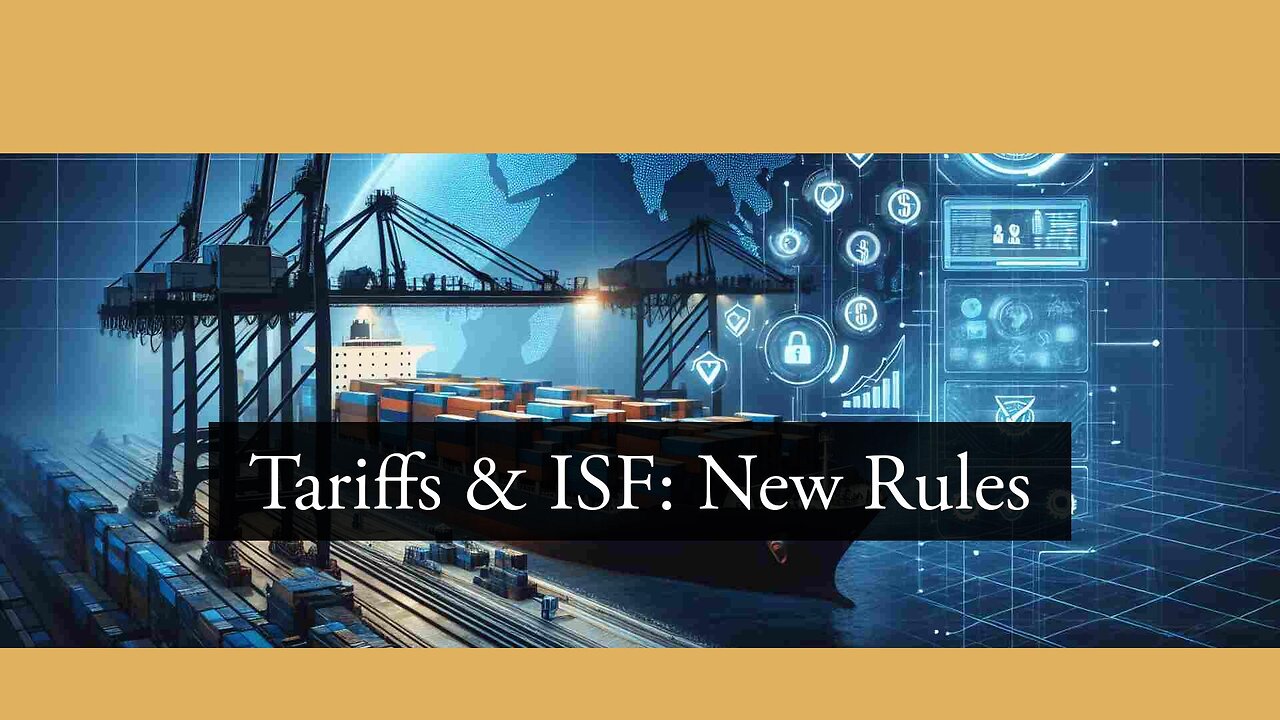Premium Only Content

Navigating Tariffs: Ensuring Compliance with ISF Filing Regulations
License To Import // 323-578-6432 // file@licensetoimport.com // www.licensetoimport.com
In this video, we discuss how tariffs can impact ISF filing regulations and compliance in the realm of customs brokerage. Tariffs, which are government-imposed taxes on imported goods, are an integral part of international trade. We explain that the ISF is a mandatory filing requirement for ocean shipments entering the United States, and importers must provide specific information about their cargo to the US Customs and Border Protection. We delve into the ways in which tariffs can affect ISF filing, including changes in the value of imported goods, alterations in the country of origin, and revisions to the classification of goods. Importers must work closely with experienced customs brokers and leverage technology to ensure accurate and timely ISF filings.
#usimportbond #isfcustomsbroker #uscustomsclearing #isfentry
Video Disclaimer Here: This video is solely for education and is not endorsed by any US government agency.
00:18 - Tariffs are government-imposed taxes on imported goods to protect domestic industries, regulate trade flows, or generate revenue. They impact customs processes like ISF filing regulations and compliance.
00:41 - ISF is a mandatory filing for ocean shipments entering the U.S., requiring importers to provide specific cargo information to CBP at least 24 hours before departure.
01:08 - Tariffs affect ISF filings by changing the value of goods, influencing the country of origin, and requiring reclassification of goods based on Harmonized System codes. Non-compliance can lead to penalties and delays.
03:25 - Importers should work with customs brokers and utilize technology to ensure accurate and timely ISF filings amidst changing tariffs. Automation and expertise help streamline the process and minimize errors and delays.
-
 1:55:20
1:55:20
TheDozenPodcast
19 hours agoPrison Officer EXPOSES deaths in custody: Sam Samworth
13.2K3 -
 25:23
25:23
Fit'n Fire
20 hours ago $0.30 earnedThe Krink at Home Part 2 - PSA 300 Blackout Krink vs PSA 5.56 Krink
15.8K4 -
 1:01:29
1:01:29
PMG
18 hours ago $1.85 earnedTrump's Speech, SCOTUS Forces USAID Payments, and Justice For MRNA Vaccine Victims
17K6 -
 4:23:59
4:23:59
STARM1X16
14 hours agoSunday Night Duos
96.2K4 -
 1:02:11
1:02:11
The Dan Bongino Show
1 day agoSunday Special with Vince Coglianese, Rep. Tim Burchett, Rep. Byron Donalds & Vivek Ramaswamy
232K362 -
 2:29:38
2:29:38
TheSaltyCracker
14 hours agoPiss Off War Pigs ReeEEeE Stream 03-09-25
235K433 -
 1:03:55
1:03:55
Sarah Westall
15 hours agoCanada Media Mind Control to increase Assisted Suicide, Confusion & Enslavement w/ Jasmin Laine
90K19 -
 2:41:11
2:41:11
Canal Paulo Figueiredo
2 days agoPedro Valente Debunks The Myths of Jiu-Jitsu History
91.2K9 -
 2:01:46
2:01:46
vivafrei
15 hours agoEp. 254: China to Pay $24 BILLION? Who Owns Embryos? Tulsi was RIGHT on Syria! Prorogation & MORE!
203K178 -
 3:40:55
3:40:55
MyronGainesX
1 day ago $25.73 earnedFormer Fed Explains Gabby Petito's Murder
119K43